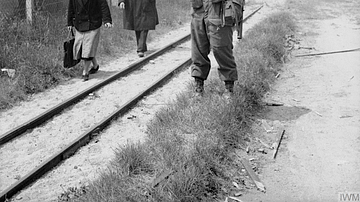In this collection of resources, we look at the events of D-Day, 6 June 1944, when the Allies stormed the Normandy beaches in France on the first day of a campaign to free Western Europe from occupation by Nazi Germany during the Second World War (1939-45). We examine the objectives of D-Day, each of the five beaches of the landings in detail, and the experiences of the civilians who found themselves involved in one of the most momentous days in history.
In twenty-eight years of service, three wars, fourteen overseas tours of duty, thousands of faces, only Normandy and D-Day remain vivid, as if it happened only yesterday. What we did was important and worthwhile.
(Charles Sullivan, quoted in Ambrose, 367)






